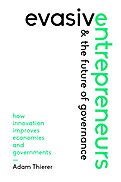Evasive Entrepreneurs and the Future of Governance: How Innovation Improves Economies and Governments
(Cato Institute, April 2020)
During the event, submit questions on Twitter using #CatoBooks, Facebook Live, or in the comment box on this page. Follow @CatoEvents on Twitter to get future event updates, live streams, and videos from the Cato Institute. If you have questions or need assistance registering for the event, please email our staff at events@cato.org.

This work is licensed under a Creative Commons Attribution-NonCommercial-ShareAlike 4.0 International License.
